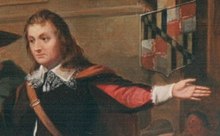William Stone (Maryland governor)
American politician, Maryland
William Stone, 3rd Proprietary Governor of Maryland (c. 1603–c. 1660) was an English pioneer and an early settler in Maryland. He was governor of the colony of Maryland from 1649 to 1655.

Quotes about Stone
edit- Until Stone's appointment, Maryland's Catholic rulers had had to struggle with indigenous Protestants, Protestants from Virginia, and Protestants in England to retain control. Stone further complicated matters when in 1649 he invited a group of some 500 Puritans to settle what is now Annapolis. As the proprietor's representative, he soon found himself on the defensive when the Commonwealth government in England appointed Maryland's old enemy Claiborne, the Puritan leader at Annapolis, and two Protestant sea captains to obtain the submission of the Chesapeake colonies. Claiborne and the Puritan leader went to St. Mary's in 1652, ejected Stone from governorship, and sought to establish a new administration under their control. When Stone, under orders from Lord Baltimore, resisted, they appointed William Fuller as governor, and in 1655 civil strife broke out. The Puritan faction quickly won a decisive victory.
- William E. Nelson, "The Battle for Baltimore," ch. 6 of The Common Law in Colonial America vol. 1 (Oxford, England: Oxford University Press, 2008), p. 102.
- Hon. William Stone, Governor of Maryland, was the second son of Lord Dunlam of Sussex, England, whose family name was Stone. Owing to unkind feelings between him and his father and a brother, William Stone left England to seek his fortune in the American colonies. ... A letter was written urging his son to return (was supposed to be the contents), but his son, deeply resentful, destroyed the letter unopened. Some years later another letter came which met the same fate. Many years later the respected Governor had been gathered to his fathers. After his death it was discovered the announcement of his succession of the title and estate in England. He had unwittingly destroyed the proof of his inheritance. This was discovered by his descendant, Thomas Stone, the signer of the Declaration of Independence. A British officer, Captain Ponsonby, was found to be a younger member of the family and the succession went to him in default of the real heir.
- James Edmund Nowlin, "Governor William Stone and Descendants," ch. 1 of "The Stones in Maryland," §2 of The Nowlin-Stone Genealogy ed. by Mary Nowlin (Salt Lake City, Utah: Martha Webb Nowlin, 1916), pp. 473–474.
Murray N. Rothbard, "Maryland", ch. 12, Pt. II of Conceived in Liberty vol. 1 (Arlington House, 1975)
edit- [A]fter Leonard Calvert died in 1648, Lord Baltimore appointed the Protestant William Stone as governor. He required the governor to take an oath not to violate the free exercise of religion by any Christians, specifically including Roman Catholics. Subsequently, in April 1649, the Maryland Assembly passed the famous Toleration Act, which guaranteed all Christians the free exercise of their religion. However, tolerance and religious liberty went only so far and the death penalty was levied against all non-Christians, including Jews and Unitarians. Neither did toleration extend to freedom of speech, for any use of such religious epithets as "heretic" and "popish priest" was outlawed. Also prohibited on the Sabbath were swearing, drinking, unnecessary work, and disorderly recreation. Actually, the much vaunted Toleration Act was a retreat from the religious liberty that had previously prevailed in Catholic-ruled Maryland, and was a compromise with the growing spirit of Puritan intolerance.
- Pages 116–117.
- The Catholic royalist deputy governor, Thomas Greene, foolishly decided to recognize Charles II in the same year as the legitimate ruler of England. This proclamation naturally angered Parliament and precipated[sic] severe reaction. The following year Parliament sent to the Chesapeake colonies commissioners, of whom the angry Claiborne was one, to subdue the recalcitrants. After settling matters in Virginia, the commissioners proceeded to Maryland, where they removed the governor and ousted the proprietary. Governor Stone was reinstated, but he, in turn, persisted in trying to reinstate the authority of the proprietor. He compounded his difficulties by insisting on imposing an oath of allegiance on Lord Baltimore. The oath offended Puritans. Stone then denounced the Puritans and the commissioners as fomenters of sedition. The result was the capture of St. Marys by the commissioners in 1654, and their appointment of a Puritan Council and of Capt. William Fuller as governor. Catholics were now excluded from voting and from the Assembly, and the Toleration Act as well as the rule of the proprietor were canceled. A law of 1654 declared that "none who professed and exercised the popish religion could be protected in this province." The law disfranchised not only Catholics, but also Anglicans. The Puritans made it clear that freedom of worship would now be extended only to Protestants free of either "popery or prelacy."
Former governor Stone now raised his insurrectionary army loyal to the proprietary, and in 1655 attacked Providence, the principal Puritan settlement in Maryland. The erstwhile governor was crushed by a force of Puritan planters, Stone was imprisoned, and several of his followers executed, even though they had been promised their lives before surrender.
- Page p. 117.